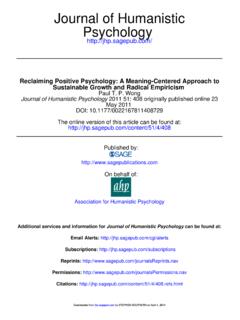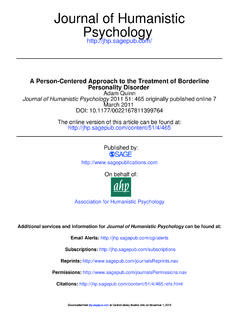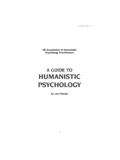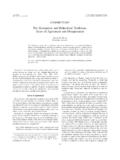Transcription of Humanistic Psych to Positive Psych - Union Street …
1 Contributions of Humanistic psychology to Positive psychology Arthur Warmoth Stella Resnick Ilene Serlin Division 32 of the American Psychological Association In his presidential address, Martin Seligman (1999) laid out a vision for a " Positive psychology " which promises expanded horizons for future psychological research and practices. It also echoes themes expressed by Humanistic psychologists over the past three decades, initiated by the work of two other presidents of APA, Carl Rogers and Abraham Maslow, leading founders of Humanistic psychology . The term " Positive psychology " itself was first used in Maslow's ground-breaking book Motivation and Personality (1954) the last chapter of which, entitled "Toward a Positive psychology ," lays out a research agenda that has much in common with Seligman's proposal.
2 This article will explore the common ground between Positive and Humanistic psychology , and respond to Positive psychology 's useful challenges to Humanistic psychology (Seligman, 1999, personal communication) about research and a concern for social values, because the outcome of a dialogue between them can help the human condition: a goal that is central to both. This paper therefore begins with a brief review of the Humanistic movement and its ongoing call for a more Positive psychology . We then move into an exploration of the unique research approaches and areas of study dictated by the primacy in Humanistic psychology of human experience.
3 We conclude by showing how Positive psychology can gain from recognizing the merit of experiential, process-oriented research methodologies and perhaps most importantly, by entering into a larger dialogue with Humanistic psychologists for the serious investigation of such metapsychological issues as the nature of truth and ways of knowing, and the role of choice, values, and meaning in Positive human and social evolution. Humanistic Origins of Positive psychology The first phase of Humanistic psychology , which covered the period between 1960 to 1980, was largely driven by Maslow's agenda for a Positive psychology . It articulated a view of the human being as irreducible to parts, needing connection, meaning, and creativity.
4 As the intellectual core of the human potential movement, Humanistic psychology had a broad impact both on the field of psychology as well as the culture at large. This holistic perspective on psychological development and self-actualization laid the foundation for the professions of individual and family counseling (Satir, 1964) and organizational development consulting(Massarik, 1992). The study of peak experiences and self-actualization was popularized throughout the culture. Humanistic psychology also affected the educational system with its views on self-esteem and self-help, offering tools for personal and spiritual transformation. For example, the state of California funded a study of self-esteem which was sponsored by John Vasconcellos, past president of the Association for Humanistic psychology and at the time Chairman of the Ways and Means Committee of the California Assembly.
5 (Mecca, Smelser & Vasconcellos, 1989). The Humanistic psychology Division (32) of the American Psychological Association was founded in September, 1971 in response to the call for theory construction, research, and clinical professional education in Humanistic psychology . Humanistic psychology has continued as an organized movement that focuses research and educational efforts on the study of human experience. Besides Division 32, the organizational structures that carry the movementforward include the Association for Humanistic psychology , as well as the graduate programs of the members of the Consortium for Diversified psychology Programs, Institute of Transpersonal psychology , Saybrook Graduate School, Seattle University, Sonoma State University, State University of West Georgia, Union Institute, Universidad Aut noma de la Laguna (Mexico), and Harmony Institute (Russia).
6 It includes The Humanistic Psychologist and the journal of Humanistic psychology as well as the Association for Transpersonal psychology and the journal of Transpersonal psychology . The first brochure of Division 32 stated in its mission statement: " Humanistic psychology aims to be faithful to the full richness of human experience. Its foundations include philosophical humanism, existentialism, and phenomenology. Its approach to the science and profession of psychology accepts the challenge to develop a systematic and rigorous understanding of human beings." Humanistic psychologists investigate not only suffering and trauma, but also growth and creativity, dreams, ethics and values (Frankl, 1959; James, 1961; Maslow, 1971; May, 1958).
7 They want to know what works, and how to assess outcome in therapy (Bohart, 1997; Schneider, & Eagle, 1996-7). Humanistic Research Methodologies A critical issue in developing a Positive psychology is whether the dominant objectifying approach of twentieth century experimental psychology is sufficient to measure the uniqueness of human experience. For most of the past century, psychology has preferred a model of science that deals with phenomena that can be treated as "objects of study." There is no question but that objective information about psychological and social systems can make important contributions to Positive psychology . However, human beings are not just objects, but they are also subjects.
8 As conscious beings, they have a rich subjective inner experience, composed of more than thoughts. The challenge is to find a methodology which is adequate to describe this full range of the experience of being human. Humanistic psychologists, while embracing the need for rigorous science, have therefore argued for a science which captures the primacy of experience over abstract truths, uniqueness along with universality, descriptive or qualitative research methodology which captures the unique lived experience (Giorgi, 1970, 1971), "the centrality of the experiencing human being and the actualization of the human potential" (Arons, personal communication, 1999).
9 This science would include the full range of human experience: the place for the dark side, the romantic side, and an appreciation of awe (Schneider, 1998; Schneider & May, 1975), the importance of creativity and the body (Arons, 1995; Criswell, ; Elkins, 1999; Greening, 1977; Krippner, 1988; May, 1975; Resnick, 1997; Richards, 1997; Selver, C., 1966; Serlin, 1996, 1999; Stern, ) and authenticity (May, 1953, 1958; Bugental, 1963, 1989). A second methodological issue concerns values and the nature of choice and free will. Positive psychology is about choosing wisely, individually, as persons and collectively, as social groups. Choosing well or wisely can be illuminated by the scientific study of objectified human nature, but the process of choice is a conscious experience that can only be revealed fully through conscious self-reflection and dialogue.
10 A third metatheoretical issue is about the nature of truth. Humanistic psychology is both holistic and descriptive; it does not understand by analyzing something into parts, but instead focuses on the whole aspect of a phenomenon, all levels of body, speech and mind, the phenomenon in context to its surroundings and its history. Maslow (1971) said: "If I had to condense the thesis of this book into one would have stressed the profoundly holistic nature of human nature in contradiction to the analytic-atomistic Newtonian approach of the behaviorisms and Freudian psychoanalysis" (p. ix). Understanding human nature means taking all levels-individual, group, social and political, physiological, cognitive, affective, imaginal, spiritual-into account (Allport, 1937; May, 1960; Maslow, 1971).










